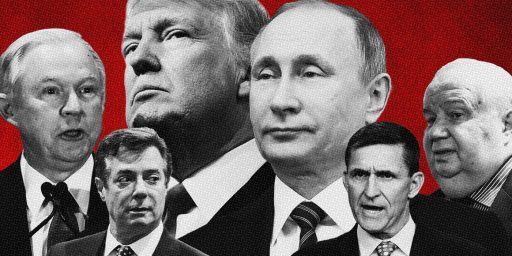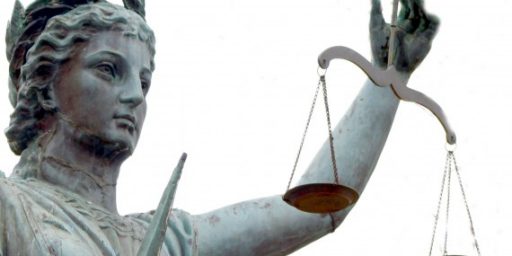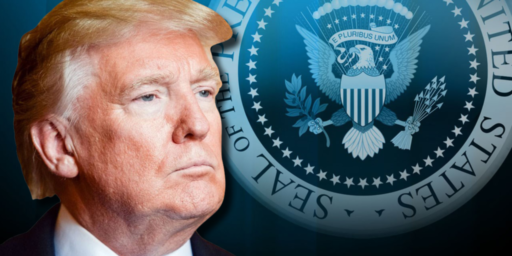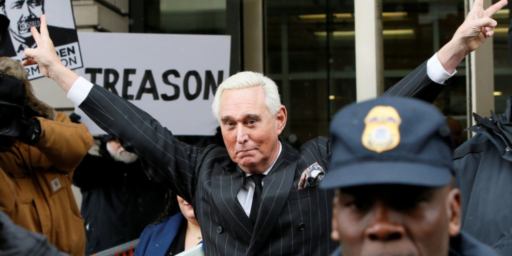Pardon Power
A commenter at Balloon Juice, in a discussion on the Scooter Libby matter, writes,
So, reading up on pardons, it doesn’t seem like the President can pardon someone without their accepting guilt in the matter, and furthermore, the pardon must trickle through the DoJ and some time must pass after the sentence has already been served.
A president can pardon whomever he wants, whenever he wants, for any reason he wants. It’s a plenary power granted him under Article II, Section 2 of the Constitution:
. . . he shall have Power to Grant Reprieves and Pardons for Offences against the United States, except in Cases of Impeachment.
President Ford pardoned Richard Nixon without his accepting guilt or, indeed, without any criminal proceedings even underway. So, certainly, President Bush can pardon Libby if he so desires. The only limiting factor is possible political fallout.
FindLaw has an excellent summary of the various judicial rulings over the years. In the early days, it was held that a pardon must be accepted by the beneficiary as a “deed.” By the early 20th century, though, that doctrine was largely dispensed with under the rationale that,
A pardon in our days is not a private act of grace from an individual happening to possess power. It is a part of the constitutional scheme. When granted it is the determination of the ultimate authority that the public welfare will be better served by inflicting less than what the judgment fixed.
In any case, accepting a pardon was never legally considered the admission of guilt. Public perception, of course, is another matter entirely.
What has happened is that the DOJ has developed a set of guidelines for processing the hundreds of pardon requests that come in every year. The high profile cases that we read about are but a small fraction of the pardons issued; most recipients are just ordinary criminals with unusual circumstances who wouldn’t otherwise get noticed by a president. Additionally, customs have developed. For example, Answers.com notes,
President Ronald Reagan, following his convictions about crime as well as a trend that was already under way, normally refused to consider applications for pardons until five to seven year after offenders had served their full sentences. Then the pardon attorney, an officer in the Justice Department, supervised a thorough investigation to determine whether the offender had been a law-abiding and constructive citizen since leaving prison. Few measured up: only 9 percent of the more than three thousand applicants received pardons.
Further, as Jonathan Rauch explains,
Afraid of controversy and of being seen as soft on crime, presidents have increasingly turned the clemency process over to career lawyers in the Justice Department — who include, of course, the very people who bring the prosecutions. “There was an almost perfect storm of changes in the department that allowed the prosecutors to take charge, basically, and kind of strangle the pardon power in the department,” says Margaret Colgate Love, who was the department’s pardon attorney from 1990 to 1997 and is now in private practice. “My department didn’t care,” she recalls. “They trivialized the pardon power. It was not a high priority. It was no priority.”
Under Clinton, the bureaucratic process all but ground to a halt. In four of his first five years as president, he granted no clemency at all — only to release a chaotic flood of pardons on his way out the door. One of those pardons, of a tax fugitive named Marc Rich, brought down an avalanche of public protests and a congressional investigation.
Along came Bush. According to an Associated Press report in March, he learned to be wary of pardons as governor of Texas, after a county official whom he pardoned for a marijuana conviction was subsequently caught stealing cocaine. “Former governors tend to pardon less,” says P.S. Ruckman, a political scientist at Rock Valley College who is writing a book on pardons. “Republicans tend to pardon less. And whenever a president follows a pardon controversy, they tend to cut off use of pardons. You put it all together, and there’s no reason anyone would expect him to use the pardon power with great frequency.”
Thus, while politics may inspire the granting of pardons, as in the cases of Richard Nixon, the Iran Contra conspirators, and Bill Clinton’s outgoing pardons, politics tends to limit the issuance of pardons. Presidents hide behind bureaucratic rules to shield themselves from criticism. But they are free to issue pardons as they please, so long as they’re willing to take the heat.






That’s rich. Marc Rich, I mean. Kind of makes President Clinton’s last minute pardons look even worse, doesn’t it?
Kind of makes President Clinton’s last minute pardons look even worse, doesn’t it?
That’s always the problem with lame ducks. To the extent political considerations are the main limitation on a power, the lack of political concerns is a concern.
Well, that was me, typing too fast, which I tried to ammend in the follow up post:
“The President can pardon at any time, but usually doesn’t.”
March Rich’s pardon was conditioned on him paying a $100 million fine, IIRC. Also, it did him no good s he’s still wanted on state tax evasion charges, which the President can’t pardon.
I’m hoping that the left goes full bore on this. Taking positions that put them further and further out on a limb. Then have Bush pardon Hillary on the murder of Vince Foster. Who cares if she did it or if he was murdered vs suicide, by the house of cards logic they are likely to construct they would hang themselves.
I think the only thing to add to the general information presented above is that the Supreme Court has interpreted the language of the Constitution to include: pardons, conditional pardons, commutations of sentence, conditional commutations of sentence, remissions of fines and forfeitures, reprieves, respites and amnesties. Hence the major goof of most mainstream analysis – to date – is that Bush can only keep Libby out of jail with a pardon or a commutation. Such would, of course, be entirely disruptive of the judicial process and would bring on the usual “controversy.” In fact, Bush can delay Libby’s entrance into prison with a series of respites, right up to the final day of the term if he so desires.